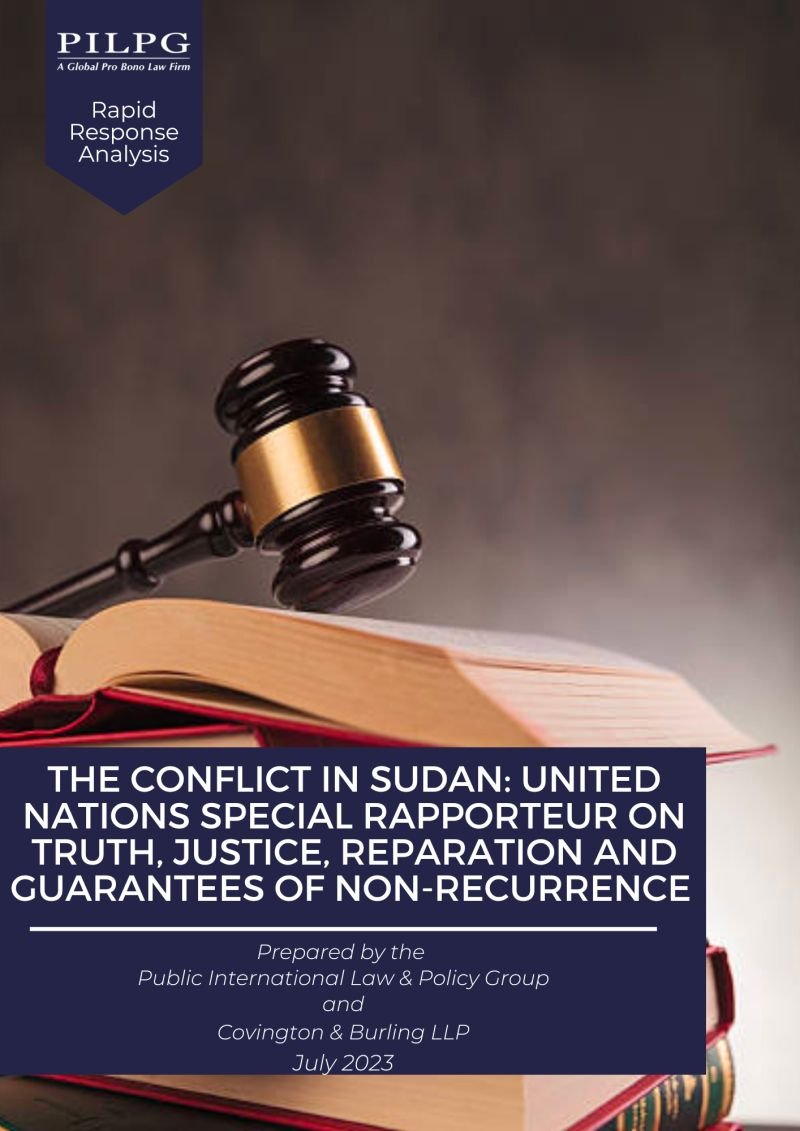
This Rapid Response Analysis provides an overview of the formation and objectives of the Independent Fact-Finding Mission for Sudan (the “Sudan FFM”), as established by the UN Human Rights Council on October 11, 2023. By drawing on lessons learned from previous fact-finding missions, this Analysis also examines the potential impact of the Sudan FFM.

The conflict that erupted between the Sudanese Armed Forces and the Rapid Support Forces in April 2023 continues to cause extreme hardship in Sudan, with hundreds of thousands seeking refuge or being forcibly displaced from their homes. There are reportedly more than 3.6 million internally displaced persons currently in Sudan.
PILPG collaborated with Covington & Burling to produce a Rapid Response Analysis in light of these developments. The analysis, written by Covington’s Bart Szewczyk, Philipp Tamussino, Ruth Scoles Mitchell, and Karolina Reiter, and PILPG’s Alice Welland, Adrienne Fricke and Chris Goebel, sets out the mandate of the United Nations Special Rapporteur on the Human Rights of Internally Displaced Persons and the submissions procedure available to individuals and groups, and concludes with an assessment of the benefits of engaging the Special Rapporteur on the current situation in Sudan.

The conflict between the Sudanese Armed Forces (SAF) and the Rapid Support forces (RSF) that erupted in April 2023 has led to the death and injury of thousands of Sudanese civilians. Civilians are harmed by the conflict in fundamental aspects of their lives, yet, to date, civilians have been sidelined in ceasefire talks while the negotiations have focused on armed actors. This Rapid Response Analysis goes into depth on the topic of civilian inclusivity, a key to lasting peace in Sudan, by examining how civilian participation may be promoted for an inclusive ceasefire in Sudan.

The crimes perpetrated by members of both the Sudanese Armed Forces and the Rapid Support Forces since the outbreak of conflict on April 15, 2023, bear strong indications of qualifying as war crimes and crimes against humanity. Notably, the Prosecutor of the International Criminal Court stated on July 13th that his office is examining new atrocities in the Darfur region, extending the initial ICC investigation under the continued mandate of UN Security Council Resolution 1593.
Despite the absence of provisions for command responsibility in Sudan's domestic law, this analysis unveils several avenues that may facilitate the retroactive application of command responsibility, which seeks to hold leaders of the Sudanese Armed Forces and the Rapid Support Forces accountable for the actions of their subordinates. Therefore, it becomes of utmost importance for all participants in future peace negotiations to be aware that they could potentially be negotiating with individuals, such as General Abdel Fattah al-Burhan and General Mohammed Hamdan Dagalo, who might be held liable for war crimes and crimes against humanity under the doctrine of command responsibility.

The Special Rapporteur is an independent human rights expert tasked with reporting, advising, and advocating on critical human rights concerns, particularly regarding transitional justice. The ongoing conflict in Sudan is causing alarming loss of life and egregious human rights violations. Furthering the investigation of such violations, the prosecution of perpetrators, reparations for victims and preventing future violations are at the core of the Special Rapporteur’s transitional justice mandate.
Read the analysis for an assessment of the advantages and benefits of engaging the Special Rapporteur to address the atrocity crimes committed in Sudan’s current conflict.

Given the paramount importance of Sudan’s neighborhood resistance committees in a future, inclusive Sudanese peace process, this Rapid Response Analysis compares the 2023 Revolutionary Charter For Establishing People’s Power adopted by Sudan’s neighborhood resistance committees (“Revolutionary Charter”) with important negotiation documents from Sudan’s 2022-2023 national political process: the 2022 Draft Transitional Constitution drafted by the Sudanese Bar Association Initiative, the 2022 Political Framework Agreement, and the 2023 Draft Political Agreement (“Foundational Documents”).

Having concluded the May 11, 2023 Jeddah Declaration of Commitment to Protect the Civilians of Sudan and May 20, 2023 Agreement on a Short-Term Ceasefire and Humanitarian Arrangements, the negotiation parties are continuing talks, facilitated by international actors, to end fighting and reduce humanitarian suffering in Sudan.
Building on the important achievements in that declaration and agreement, the purpose of this Rapid Response Analysis is to provide guiding principles for the next phase of Sudan ceasefire negotiations to ensure effective and inclusive participation of civilians in ceasefire-related processes, according to international best practices.



